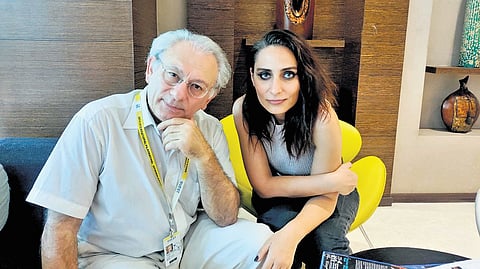

THIRUVANANTHAPURAM: His year’s International Film Festival of Kerala (IFFK) is celebrating Armenian cinema in its ‘Country Focus’ section, giving audiences a chance to discover the rich stories of this small yet resilient northwestern Asian nation. Filmmakers Mikael Dovlatyan, Serge Avedikian, and producer Karina Simonyan shared their thoughts on the history, struggles, Indian connection, and future of Armenian cinema.
Armenia has many important stories to share, remarked Avedikian. “During the Soviet era, Armenia’s film industry thrived despite political and economic pressures. Yerevan, the capital, once had over 50 theatres, showing how deeply cinema was loved. But after the Soviet Union collapsed, Armenia faced tough times as it built its independence, leaving little money for cultural activities like filmmaking. Today, only a few theatres remain. Yet, Armenian filmmakers have been telling stories for over 100 years,” says Avedikian, a recipient of the Short Film Palme d’O -- the highest prize given to a short film at the Cannes Film Festival.
He added that while filmmakers such as Sergei Parajanov are famous worldwide, many others from Armenia’s Soviet period remain largely unknown.
Avedikian hopes that showcasing Armenian films at international festivals like IFFK will help bring attention to these lesser-known voices. The festival is also a chance to create new opportunities for Armenian cinema to reach global audiences.
Dovlatyan emphasised that his films, like Labyrinth, which have been featured at IFFK, focus on human struggles, making them relatable to global audiences.
“I always believe that cinema can bridge cultures. Be it Syrian, French, American, or Indian, human struggles are universally applicable.. I know that when I take these themes, I can speak to people from different cultures,” he shared.
Speaking about how Armenian cinema is expanding its reach, he says the process has been gradual. “Currently, the Armenian National Film Foundation is working on funding to distribute movies across various online platforms. Existing forms are limited. While you can find Armenian movies on YouTube, they lack subtitles. We are working on improving that.”
Simonyan, who is also an actor, sees potential for collaborations between Armenia and India. “Armenia and India are both ancient cultures with so much in common. And there is a point where these cultures can meet. Indian films have a special place in Armenian hearts because in Armenia, during the 70s and 80s, Indian movies were frequently shown. Many grew up watching them,” she said.
Dovlatyan and Avedikian reminisced about watching Indian films during their youth. “We loved Indian cinema. We would laugh, cry, enjoy the music, and even try to dance like in the movies!” Today, a growing Indian community in Armenia continues to strengthen this connection.
Film education should be more accessible, says Payal Kapadia
Calling for systemic changes to make film education more inclusive, Cannes Grand Prix-winning filmmaker Payal Kapadia said here on Wednesday that one needs a certain kind of privilege to access film schools and that there should be more film schools which are inclusive or even free. “For me, film school was essential.
It helped me focus and introduced me to amazing people. It is not necessary to go to a film school to be a filmmaker, and it is one’s temperament that matters.
There should be more grants and stipends to support aspiring filmmakers,” Kapadia said at the ‘In Conversation’ session as part of the IFFK. Finding inspiration in the mundane, she said she titled her films in a way that invokes the imagery of nature and daily life.
“Inspiration is everywhere. Even a flower or a chai conversation can spark a story. The film festival and the people here could also make an interesting film,” she said. Touching on networking and building a film circle for independent filmmakers, Kapadia told TNIE that while independent filmmakers often face challenges in sourcing people, the upside is that those who join such projects, despite lower pay, are genuinely passionate and believe in the vision.